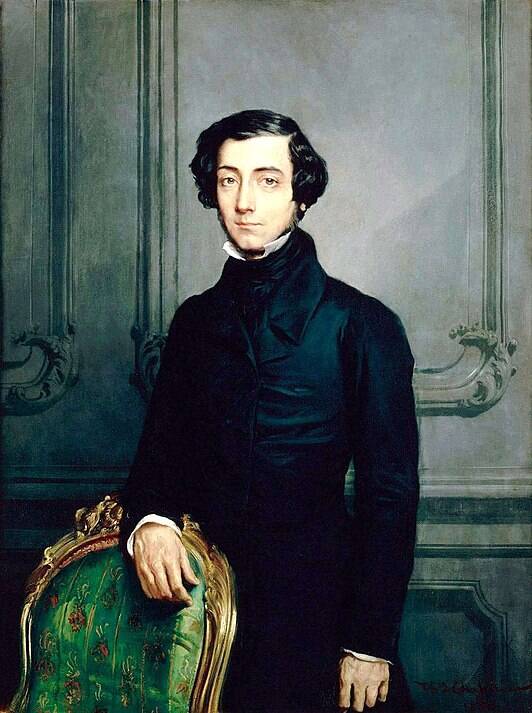Alexis de Tocqueville

Alexis de Tocqueville (1805-1859) was a prominent French historian, writer, and political thinker known for his significant contributions to the understanding of democracy and society. Born into a noble family in Normandy in 1805, Tocqueville embarked on a journey of intellectual exploration that left a lasting impact on political thought.
Tocqueville's early years were marked by his pursuit of legal studies, which he undertook diligently. The turning point in his life came in 1827 when he joined the French judiciary as a magistrate. During the tumultuous times of the 1830 revolution, Tocqueville made a noteworthy choice by aligning himself with the bourgeoisie, despite his own aristocratic background.
In 1831 and 1832, Tocqueville, along with his close associate Gustave de Beaumont, embarked on a transformative journey to the United States. This expedition resulted in Tocqueville's seminal work, "Democracy in America", which was published in two volumes in 1835 and 1840. These writings provided keen insights into the American political system and society, emphasizing the rise of mass society, the middle class, and the consumer culture.
His political career continued to evolve as he became a member of the French parliament in 1839 and later joined the prestigious Académie Française in 1841. Tocqueville's prescient speech in the parliament on January 27, 1848, prophesied the impending revolution that would sweep across France.
Tocqueville's involvement in shaping the French constitution of 1848 and his brief tenure as the Minister of Foreign Affairs in 1849 underscored his commitment to political reform. The coup d'état by Napoleon III in 1851 led to Tocqueville's withdrawal from active politics.
In his later years, Tocqueville penned his memoirs, "Souvenirs," in 1851 and embarked on a major work, "L'Ancien Régime et la Révolution," though only the first volume was completed before his death in 1859.
Tocqueville's legacy extends far beyond his lifetime, with numerous scholars and thinkers studying his works. His profound observations on the dynamics of democracy, social equality, and the perils of conformity continue to be relevant in contemporary political and sociological discourse.
Tocqueville wrote about the inexorable trend toward democratization, the rise of the middle class, and the impact of societal and political changes. Tocqueville's examination of the delicate balance between freedom and equality in democracies, as evident in the United States, offers enduring insights into the complexities of modern society.
Alexis de Tocqueville's work primarily focuses on the impact of democratic government and centralized bureaucracy on society. He highlighted the decline in civic engagement, the erosion of local governance, and the rise of administrative despotism due to the centralization of power. Tocqueville emphasized how this centralization leads to citizens' dependency on the state, causing them to relinquish responsibility for their private and public well-being. He illustrated the detrimental effects of administrative centralization, which disconnects individuals from public affairs, fosters apathy, and diminishes the spirit of civic engagement. Additionally, Tocqueville emphasized the consequences of government's attempts to control citizenship, turning it into a policy tool rather than a fundamental democratic element. His observations underscore the dangers of an overbearing government and the resulting decline in societal engagement, ultimately warning against the loss of public spirit and the encroachment of bureaucratic control on individual lives and freedoms.